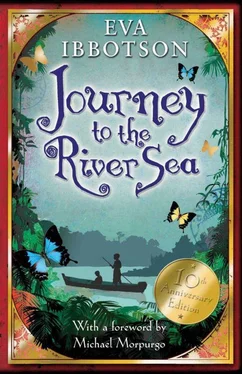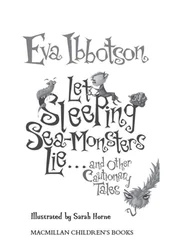‘I think we might have a look in the museum,’ she said. ‘It’s probably free. Perhaps I could offer them my necklace.’
‘What necklace is that?’ said Maia, surprised. She had never seen her governess wearing jewellery.
‘It is made up of all the milk teeth of my sister’s children. She gave it to me as a farewell present. She has six children so there are a lot of teeth,’ said Miss Minton in an expressionless voice.
The museum was behind the customs house, not far from the river and the docks. It was a yellow building with a domed roof and the words Museum of Natural History painted on the door. Inside, it was a marvellous jumble of stuffed animals in glass cases, skeletons hanging from wires, drawers full of rocks and insects and feathers. There were three rooms downstairs and two more upstairs which housed tools and carvings made by Indians from all over Amazonia.
Maia and Miss Minton wandered about happily. Some of the stuffed animals were unusual; a manatee, a kind of sea cow, which looked like a great grey potato with little bumps and knobs on its skin, and a forest tarsola. But some were just ordinary animals that people had brought in from the jungle. And in one glass case there was a stuffed Pekinese labelled: Billy: the faithful friend of Mrs Arthur Winterbotham .
Museums do not usually show stuffed lapdogs, but the curator was an Englishman with a kind heart and Mrs Winterbotham, who had raised a lot of money for the museum, had really loved her dog.
Maia was admiring a shrunken head, when she heard a small exclamation and turned to find that Miss Minton was standing in front of a display case showing specimens of dried plants. The plants did not seem to be particularly exciting, but Miss Minton was so absorbed that Maia came over to stand beside her.
‘The Bernard Taverner Collection of Medicinal Plants from the Tajupi Valley,’ she read.
The plants were carefully labelled with their names and what they were used for. A few Maia had heard of — quinine bark to treat malaria, morning glory seeds to bring on sleep — but most were strange to her.
‘This is one of the most important collections in the museum,’ said a voice behind them, and they found that Professor Glastonberry, the curator, had come out of his office. ‘He was a fine naturalist, Taverner.’
The professor was a big, portly man with a fringe of white hair framing a pink skull, very blue eyes and an old linen jacket from which a handkerchief protruded. The handkerchief did not have much to do with the professor’s nose; it was used to mop up dye or formalin, wrap up a delicate specimen, or wedge a rickety stand. He had been putting together the skeleton of a giant sloth and was still carrying one of its claws in his hand.
‘When did Mr Taverner present the collection?’ asked Miss Minton.
‘Five years ago when he came back from the Tajupi. But he often brought things in — that banded armadillo came from Taverner. He never killed more than he needed though; once he had a specimen, he left the rest alone.’
He sighed, remembering the man who had been his friend. Then the door was flung open, loud footsteps sounded on the wooden floor, and they found Mr Trapwood and Mr Low making their way towards them.
‘Oh no, not the crows again,’ whispered Maia, and was frowned into silence by Miss Minton, who pulled her away from the display case and led her out of sight behind the manatee.
‘Professor Glastonberry?’ asked Mr Trapwood, wiping his face. Black suits are not the best things to wear in the tropics and he was sweating heavily.
The professor nodded.
‘We understand that you knew Bernard Taverner? That he gave a collection to the museum?’
The professor nodded again. ‘Medicinal herbs, very interesting; over there.’
The crows looked disappointed; they had probably expected stuffed jaguars and enormous throwing spears.
‘We would like to ask you some questions about Mr Taverner,’ said Mr Trapwood. ‘Trapwood and Low: Private Investigators.’ He took a card out of his pocket and handed it to the professor.
The professor looked at it and gave it back. ‘I’m afraid I’m very busy.’
‘It won’t take long. We know that Bernard Taverner died about four months ago. What we want to know is the whereabouts of Taverner’s son.’
‘What we must know,’ squeaked Mr Low. ‘He is to be brought back to Westwood without delay.’
The professor blinked at him.
‘I’m afraid that won’t be possible,’ he said.
‘Why is that?’
‘Because Bernard Taverner didn’t have a son,’ said the Professor. ‘And now if you’ll excuse me…’
‘I’m glad,’ said Maia, as they left the museum. ‘I’m glad he hasn’t got a son. I don’t know what West-wood is, but it sounds horrid. I suppose it’s a prison, like Wormwood Scrubs or Pentonville?’
And Miss Minton said, ‘Yes.’
They were to meet the Carters at the theatre box office at four o’clock. As they crossed the square with its tall brass lamps and flowering trees, Maia was more and more awed.
‘Imagine Clovis acting there…’ she said. ‘It’s a really famous place, isn’t it?’
Miss Minton nodded. ‘Caruso sang there,’ she said. ‘And Sarah Bernhardt came to act; she was seventy years old, but she played Napoleon’s young son and she was a sensation!’
‘Goodness!’ Maia was impressed. If a woman of seventy could act Napoleon’s son, then surely Clovis could manage Little Lord Fauntleroy . ‘I’m really looking forward to seeing him again,’ she said. ‘It’s only a week now before they come.’
The twins and their mother were waiting.
‘We’ve got our tickets,’ said Beatrice. ‘We’re going to Little Lord Fauntleroy on Monday afternoon, and on Saturday we’re going to see Twelfth Night . That will be boring because it’s Shakespeare. But Little Lord Fauntleroy will be good.’
‘Yes it is. We saw Clovis rehearsing. He was splendid.’
The twins stared at Maia. ‘Oh, you aren’t going! We got the tickets weeks ago, before we knew you were coming. They’re all sold out, aren’t they, Mummy?’
Mrs Carter nodded absently. She was sending the doorman out for a cab.
‘I promised Clovis I would be there,’ said Maia, fighting off tears. ‘I promised.’
‘He’ll have forgotten,’ said Gwendolyn. ‘Actors don’t remember people. He’ll have forgotten that he ever met you.’
And they followed their mother to the waiting cab.
The twins were wrong about Clovis. He wasn’t clever, but he was faithful and as soon as the Pilgrim Players arrived in Manaus, he asked where he could find a place called Tapherini or House of Rest, and a family called Carter.
No one seemed to know about the House of Rest, but he was told that the Carters lived in a bungalow an hour’s journey from Manaus and could only be reached by boat.
‘You can’t go gallivanting off now,’ said Mrs Goodley. ‘We’ve got the dress rehearsal this afternoon. And when you see the theatre you won’t want to. It’s twice the size of anything you’ve played in before.’
This did nothing to cheer up Clovis, who said he felt sick.
‘Everyone feels sick in this dump,’ said Nancy Goodley.
The company had taken the top floor of the Hotel Paradiso, which was the cheapest hotel in Manaus. It was also the worst. Grey slugs crawled over the wooden floors of the showers, the lavatories were filthy and the smell of bean stew being tortured to death in rancid cooking oil stole through the rooms and corridors all day.
‘It’s no good having the vapours now,’ said Mrs Goodley sharply. ‘Remember, everything depends on you. If Fauntleroy ’s a sell-out we can pay off the sharks and get a passage to the next place but if not, God help us all.’
Читать дальше












